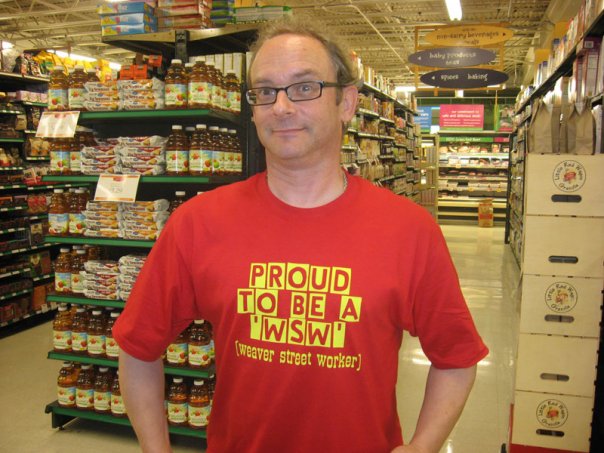Wednesday, September 19, 2012
The Weave: Cherry-Picking 2022 Vision Feedback
A week ago, the workers of Weaver Street Market Co-operative received a write-up of the input we gave at our recent Annual Store Meetings on WSM’s 2022 Vision.
As with so much that trickles down to us from our all-powerful WSM corporate office management team, on the face of it, the write-up looked quite promising. Until you noticed what was missing.
For sure, I was overjoyed to be receiving any kind of document which publicly confirmed what we workers had ostensibly offered by way of input to a decision-making process in which we are supposed always to be fully and meaningfully involved.
But almost from the opening paragraph, the gaps and the condescending assumptions were obvious:
1) We were told that someone (er, actually me) had requested that everyone be involved in the decision-making, that we help move the vision to action, and that we have ongoing meetings.
Hmm. Almost. What I actually asked for was that we not simply be permitted to help implement the vision, but that we be allowed to help design it, too.
What we had so far was the vision of the corporate office management team. If we wanted it to be the vision of WSM, then a process had to be found whereby owners, stakeholders and workers could review the four goals advanced by the corporate office management team, and determine if these were the goals we wanted going forward, or if we would prefer different goals.
Otherwise, we would have a situation where the common needs of the co-op over the next ten years were being decided by a small group at the corporate office, and not by the body of stakeholders.
I specifically suggested that we use Panzanella on Monday evenings, when the restaurant is closed, to undertake this goal review.
There is no mention of any of this in the alleged comprehensive documentation of worker input at our Annual Store Meetings.
Of course, there isn’t. It would mean the corporate office democratically handing decision-making power to the stakeholders.
2) Neither is there any word of my second suggestion. Namely, that, when it came time to implement the vision, rather than merely seeking input from workers as to how they would like to implement the vision, WSM actually devolve to stores and departments the power to make those decisions for themselves.
Again, I’m not surprised this does not show up in our feedback document. Because, again, heaven forbid, it would mean taking power away from the self-selected few in the WSM corporate office.
Even though it makes perfect sense that those charged with implementing the vision are much more likely to be invested in that implementation if they truly helped to design the vision, and are the ones making the decisions as to how to implement it.
3) The other major omission is any negative reference to the new expansion project (three new stores), of which there has been plenty.
Workers are genuinely concerned that there are many important matters to be resolved from the last expansion project (not least the matter of the $7 million in debt still owing), all of which should be addressed before we start gallivanting around, creating more stress for the existing systems and processes.
Besides those specifics, there were two other issues which leant a certain stale flavor to the presentation in the document.
First, the opening paragraph kept talking about how ‘we’ were going to move this whole process forward. Without actually defining ‘we.’ In the past, this has usually meant the WSM corporate office management team. And there was little in the document to suggest otherwise this time.
Secondly, it was (at least for me) interesting to note that the corporate office are prepared to give us easy access to feedback (pretty little documents, in each of our mailboxes), when it suits their convenience. “Here you go chaps. What we in the corpo … I mean, what all of us have agreed ‘we’ are going to do about the corpor … I mean ‘our’ vision.”
But, when it is feedback that is not to their liking (“your new Social Media Policy is fascist crap”), you have to wade through the minutiae of our private Wikipedia site to find the document in question.
Sigh. And so it is that our blessed corporate office management team once again redefine democracy, transparency and inclusion in our very own brand of co-operation.
What can you do? Turn up at the WSM Annual Meeting. Speak up at your department meetings. Stand up to your store and department managers. And demand that all workers, owners and stakeholders be given a proper opportunity to decide for themselves what they want the goals of Vision 2022 to be, and how they want them to be implemented.
And maybe request that we have someone less partial handle feedback in future? Rather than having the corporate office take our … I mean, pick our cherries …
Uncontested Weaver Street Board Elections 2012
For the second year in a row, both of the Elections for Board Director of Weaver Street Market Co-operative (Consumer-Owner and Worker-Owner) are uncontested.
I'm not going to get into a discussion about the single candidate in each Election.
They may be root-and-branch co-operators, whose sole interest is the reintroduction of democracy and transparency into our co-op (though their Election Addresses suggest none of this).
But for each and every one of the seven years in which I have been involved with WSM, I have heard, from both worker and consumer, their repeated wish that we behave more like a co-operative.
Whether it is treating our workers better. Being more inclusive when it comes to planning the future. Behaving with social and environmental conscience when bad economic times hit. Rather than retreating into normal conventional capitalist knee-jerk fear.
And yet. When push comes to shove. When it is time to roll up our sleeves, and tackle the corporatist demon that has possessed our senior management team, where are you?
We have a Board of Directors of seven folks. Four of them are elected. Two each year. We can take back our co-op in no less than two years.
But not if we allow the establishment candidate to get a free ride each year.
Sigh.
Now, you may think that all I do is criticize. In my defence, I would say that I criticize only where I see what could be better. I never criticize without offering an alternative. And I am even-handed. I don't just criticize the WSM corporate office management team.
Plus, you will never hear me say anything bad about:
1) Those of my co-workers who have yet to discover the delights of going on a date with me.
2) All of you who believe that, with the possible exception of Shangri-La, there is no greater pleasure than an evening spent enjoying my performance as Pop Vox ... !!
Wednesday, September 12, 2012
Weaver Street Market Annual Report 2012
The WSM Annual Report has been published. And as usual, one needs a co-op sextant, three bottles of wine and half-a-dozen showers sensibly to negotiate the terribly pretty disinformation.
Sigh. Look. We are a co-op that is the largest food co-op in the South-Eastern United States. We employ 260 workers. We have some 15,000 consumer-owners. We have impact. We practically invented the farm-to-fork local food system.
I completely, absolutely, 100% acknowledge that. Applaud it. Congratulate every single one of us who makes it possible. But. That does not mean that we are perfect.
There are always ways we can be a stronger business and a better co-op (which I suggest extensively on the remainder of this blog).
That would be true of any co-op enterprise. But, in the case of WSM, it is especially true. Why? For three reasons:
1) Our corporate office management team decided, quite undemocratically, in 2007/2008, to engage in an expansion scheme to build a new store and Food House, which turned out to be a disaster of in-house management planning and implementation.
They then determined, unbeknown to the rest of us (with the exception of our rubber-stamp Board of Directors), to put us all $10 million in debt, in order to pay for the disaster.
Who cares? Well, we are all still paying for that disaster and its borrowing requirement.
Workers have been made each year to work harder for less, to come up with the some $2 million required each year to cover the repayment of principal and interest.
Consumer-owners are still receiving derisory dividends, while their corporate office management team cover up their past mistakes - and plan to make even more, by proposing to build three more stores (have a look at Goal 3, in the middle of the Annual Report).
Check the financial figures in this year's Annual Report. We still owe some $6.5 million. It will be years before this debt is completely wiped out.
In the meantime, our 'impact on the community' goes on taking an annual hit of $1.3 million, which is the interest/depreciation we have to set aside each year, just to service the continuing debt (before repaying any principal - between $500,000 and $700,000 each year).
And this is $1.3 million (interest/depreciation) plus $500,000/$700,000 (principal) we export out of our communities each year. Remember that when we praise ourselves for paying back $7.2 million into our various downtowns.
2) Our corporate office management team reacted to The Great Recession in a typically conventional capitalist fashion, quite abandoning all pretense of adherence to co-operative principles. And our Board of Directors let them.
All was cut costs, poke workers and pay attention only to sales. While muzzling any sign of dissent. It’s all I’ve been able to do even to get the WSM corporate office management team to utter the words ‘Social Bottom Line.’
3) The WSM corporate office management team have very cleverly distracted attention from (1) and (2) with extraordinarily professional PR these past four years – including the magnificent Annual Report this year.
How so? Let’s take a quick wander through that Annual Report, page by page:
A) First two pages. No mention of the deleterious effect of exporting some $2 million each year to out-of-town banks, to pay back the planning nightmare of the 2007/2008 expansion.
B) Page 3. This is a doozy. I love it when corporate offices ‘quote’ comparative figures, without giving their sources (for which I have asked, and have received no response to date).
So, you are given information about your co-op workers, which is intended to make you all warm and fuzzy about how we are being treated. Not true.
WSM compare the average annual wage increase of 5% (true) to ‘2-3% for other businesses.’ What other businesses? And who cares? We are comparing ourselves to what conventional capitalist exploitative grocery stores (think Wal-Mart) pay their workers? Really? That is our measure?
Plus, what they do not tell you is that, for example, sales over the past two years in my department alone increased by 25%. And you allow your corporate office to conclude that proper recompense for that effort is a pay raise of 5%? Really?
And bear this in mind. Every single financial figure and impact for which your corporate office management team congratulate themselves was and is made possible by your co-op workers. And yet. We see no 2022 goal suggesting that first and foremost we must now better reward our workers. Really?
C) Page 4. The figures. Profits. Right. We are still paying back some $6.5 million in long-term debt, and yet you allow your corporate office management team to set aside some $600,000 of YOUR $767,000 co-op profits, so that they can begin planning another expansion project (three new stores), a project about which you have been told next to zip.
D) Page 5 and 6. Your invited feedback on the corporate office management team's goals for 2022. Please note the delightful exercise in distraction. You are not told that you can turn around and say, um, we don’t like these goals. We’d like different ones. Why? Because this is the way democracy works in WSM.
In any other co-op, the management team take seriously the view that the co-op is a voluntary association of folk who democratically provide for their common needs, where the body of stakeholders are the ones deciding what are the common needs.
In WSM, the corporate office management team have decided that they, and they alone, determine what are your common needs. They then ask for your input, within the parameters they set. And there is then no vote. They, and they alone, decide what feedback they will include.
Can you change this? Why yes. Turn up at the Annual Meeting and say, no thank you. We’re grown-ups. We know how to tie our own shoelaces now. We’ll decide this for ourselves. And then let you, the hired help, know what it is we want you to do. Like other co-ops.
You might, for example, want to say, no, we don't want three more stores. We don't want to be bigger. We'd prefer just to be better.
Are you getting the picture?
Monday, September 10, 2012
Employee Policy Feedback Available
My fellow Weaver Street Market Co-operative co-workers will remember that a few weeks ago we were invited to offer feedback on some proposed changes to WSM Employee Policy.
The most intrusive proposed change was that relating to Social Media Policy, where (in short) the WSM corporate office management team wanted to introduce a new policy which basically said any and all output by employees online would be judged as part of their work performance.
In a twist of irony, I'm not going to share the details of our rather pithy response. Not because it reflects the proposed new policy. Ptooey! But because my fellow workers offered their views in private. And I respect that.
So. Fellow employees, you can find the feedback on your break room computers. When the Storecentral.net page opens up at the beginning, go to the "HR & Training" tab at the top, click on it, look up at the top left, and voila, feedback on Employee Policy changes.
I can share this much. The overwhelming feedback from workers on the proposed new Social Media Policy was essentially, um: "Go f**k yourselves! When I'm off-the-clock, out of the store, and on my own time, I can do what I like. Aren't we supposed to be a co-op ... ??"
Of course, feedback which overwhelming rejects a proposed change in policy of our co-op does not necessarily mean that the proposed change will be rejected, notwithstanding our co-op's stated commitment to democracy and transparency.
Our General Manager's view of 'One Man (or Woman), One Vote' is that he has the only vote ...
The most intrusive proposed change was that relating to Social Media Policy, where (in short) the WSM corporate office management team wanted to introduce a new policy which basically said any and all output by employees online would be judged as part of their work performance.
In a twist of irony, I'm not going to share the details of our rather pithy response. Not because it reflects the proposed new policy. Ptooey! But because my fellow workers offered their views in private. And I respect that.
So. Fellow employees, you can find the feedback on your break room computers. When the Storecentral.net page opens up at the beginning, go to the "HR & Training" tab at the top, click on it, look up at the top left, and voila, feedback on Employee Policy changes.
I can share this much. The overwhelming feedback from workers on the proposed new Social Media Policy was essentially, um: "Go f**k yourselves! When I'm off-the-clock, out of the store, and on my own time, I can do what I like. Aren't we supposed to be a co-op ... ??"
Of course, feedback which overwhelming rejects a proposed change in policy of our co-op does not necessarily mean that the proposed change will be rejected, notwithstanding our co-op's stated commitment to democracy and transparency.
Our General Manager's view of 'One Man (or Woman), One Vote' is that he has the only vote ...
Sunday, September 9, 2012
Friedrich von Hayek, Salma Hayek and my Economic Naughty Bits ...
As a former political love child of Margaret Thatcher in the Eighties (now, somewhat more center-left), it is perhaps not surprising that I still score a potential 2 out of 3 in agreement with Friedrich von Hayek, current economic pin-up icon of US Republican Tea Partiers [NY Times article, “Prime Time for Paul Ryan’s Guru”]:
1) Like Fred, I believe that government has no business interfering with what I regard as the natural flow of economic forces [“Job Creation: Socialism or Social Justice?”].
Government can no more predict what people as a whole are going to do with their money than I’ve been able to determine what my last three girlfriends were going to do with my naughty bits.
It follows, therefore, that action by government to bend the economy to its will, whether by lowering taxes or increasing spending, is more about appealing to political base than actually changing the economy for the good, in any permanent way.
Any interference by government almost always produces some consequence of equal and opposite effect, which then requires corrective action, which then requires … and so on. Just leave the economy well alone.
Occasionally – and only very occasionally – it can be argued that temporary interference in the economy is necessary, not least because the immediate perceived benefit to society out weighs the longer term negative consequences.
I’m bound to say though that 9 times out of 10 the perceived short-term benefit is generally political rather than strictly economic.
2) I take the view that government should restrict itself to providing services that ameliorate the consequences of economic forces upon those least able to compete in the form of economy which most finds favor amongst human beings at the moment, namely the capitalist system.
In which regard, I prefer government programs that take a long-term interest in allowing folks to empower themselves to survive the ravages of the capitalist system.
But, in the meantime, I find myself agreeing with Fred that the best way to alleviate the short-term consequences of disadvantage at the hands of the capitalist system is simply to provide those at risk with the immediate wherewithal to cope. And I have proposed just as much to my very favorite President [“FOCUS On Poverty”].
3) I do not agree with Fred’s proposition of a ‘generality norm,’ where he says that any government program that helps one group must be available to all. I get the economic and philosophical logic. That we don’t want to produce stigma with means testing.
But for all my talk of not confusing politics with economics, the fact still remains that politics is the art of the possible, and it is politicians who implement economic policy, not purist economists – unless you live in a dictatorship.
The only way fully to adhere to Fred’s ‘generality norm’ is either to throw gobloads of the public’s money at folks who simply don’t need it. Which is what you have in the UK. And against which I spoke at the British Conservative Party National Conference in 1986, to a rapturous ovation from farmers and blue rinses, who had no idea that I was telling ’em that you shouldn’t be getting free education and free health care if you drive a Jaguar.
Or, you reduce government programs to an absolute minimum, so as to ensure that sticking to Fred’s admonition (of the same government programs for everyone) actually fits the size of the public purse. Which is why Tea Partiers claim to be such strong Hayekians. This is the cherry pick onto which they latch.
In the NY Times article linked to at the beginning of this Note, Adam Davidson opines that every mainstream economic theory of the past hundred years or so began life as a crackpot sideshow.
So it is that I perceive that the coming economic norm may already be finding favor in some fairly esoteric outposts (the Occupy movement) – along with one or two surprising mainstream ones (the British Conservative Party). It’s called ‘localism.’
It is the notion that people are not ciphers. They are … well … people. And that neither politicians nor economists, acting at the national or even the regional level, can predict what people will do. We are not rationale. We don’t follow patterns. We are bloody-minded. And we do the craziest things in any given situation.
The best way, therefore, to ‘harness’ economic forces so that they best serve the people is to let the people decide for themselves how they would like to design their economic destiny. And to devolve to those people the power so to design as close to them as possible.
One of the natural consequences of such devolution of democracy is the rise of mutualism. Whether in the governance of corporate entities, the distribution of welfare or the administration of public services, such as education and policing.
It is why I continue to have such hope for my own food co-op, even when it seems hell bent on emulating every nasty conventional corporatist antic that Enron, Wal-Mart or Fox News ever dreamt up.
And it is why also, among all the ‘omnishambles,’ I continue to have a wee bit of faith in the British Coalition Government. At least on the face of it, that Government appears to preach a belief in co-operation. A belief which will find considerable underpinning if said Coalition promotes to its ranks in the coming Government reshuffle one of the most ardent Conservative Party proponents of localism and co-operation, Jesse Norman, MP.
In the meantime, with the North Carolina sun pounding down, I think I will allow my mind to dwell more happily on the prospect of an economic policy where the person predicting what happens to my naughty bits is Friedrich von Hayek’s distant relative, Salma…
Subscribe to:
Posts (Atom)


























